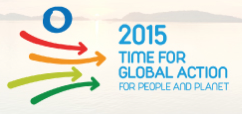The Co-Facilitators for the intergovernmental negotiation process on the post-2015 development agenda, David Donoghue of Ireland and Macharia Kamau of Kenya, have issued the zero draft of the outcome document for the UN Summit to adopt the post-2015 development agenda convening in September 2015.
The zero draft, titled ‘Transforming our world by 2030: A new agenda for global action,' was circulated to UN Member States with a letter from UN General Assembly (UNGA) President Sam Kutesa on 2 June.
 2 June 2015: The Co-Facilitators for the intergovernmental negotiation process on the post-2015 development agenda, David Donoghue of Ireland and Macharia Kamau of Kenya, have issued the zero draft of the outcome document for the UN Summit to adopt the post-2015 development agenda, which will convene in September 2015. The zero draft, titled ‘Transforming our world by 2030: A new agenda for global action,’ was circulated to UN Member States with a letter from UN General Assembly (UNGA) President Sam Kutesa on 2 June.
2 June 2015: The Co-Facilitators for the intergovernmental negotiation process on the post-2015 development agenda, David Donoghue of Ireland and Macharia Kamau of Kenya, have issued the zero draft of the outcome document for the UN Summit to adopt the post-2015 development agenda, which will convene in September 2015. The zero draft, titled ‘Transforming our world by 2030: A new agenda for global action,’ was circulated to UN Member States with a letter from UN General Assembly (UNGA) President Sam Kutesa on 2 June.
The zero draft aims to facilitate preparations for the next session of intergovernmental negotiations, on 22-25 June 2015.
A brief preamble to the document notes that the agenda is a plan of action for people, planet and prosperity, which also seeks to strengthen universal peace, and that it is to be implemented by all countries acting in collaborative partnership. The preamble includes a pledge that “no one will be left behind.”
It also notes nine items that the agenda sets out to accomplish: End poverty and hunger; Secure education, health and basic services for all; Achieve gender equality and empower all women and girls; Combat inequalities within and between countries; Foster inclusive economic growth, shared prosperity and sustainable lifestyles for all; Promote safe and inclusive cities and human settlements; Protect the planet, fight climate change, use natural resources sustainably and safeguard our oceans; strengthen governance and promote peaceful, safe, just and inclusive societies; and Revitalize the Global Partnership for Sustainable Development.
The next component is a 44-paragraph draft Declaration, including sections on: Our commitment and shared principles; Our world today; Our vision; The new Agenda; Implementation; Follow-up and review; and A call for action to change our world.
The draft then presents the 17 Sustainable Development Goals (SDGs) and their targets, as proposed by the UNGA’s Open Working Group (OWG) on SDGs in 2014. A brief introduction notes that: the targets are “aspirational and global, with each government setting its own national targets guided by the global level of ambition but taking into account national circumstances;” and that a global indicator framework will be developed under the guidance of the UN Economic and Social Council (ECOSOC) and UN Statistical Commission (UNSC) for follow-up and review of the SDGs and targets, and finalized by March 2016.
The section on Means of Implementation and the Global Partnership begins with a statement to “welcome and fully endorse” the outcome of the Third International Conference on Financing for Development (FfD 3). The introductory paragraphs to this section also highlight, inter alia: the primary role of national policies; strong commitment to Africa’s development; countries in conflict and post-conflict situations and middle-income countries (MICs); the critical importance of private finance; and that transfer of technology will be “an important dimension.” The section then lists the 62 MOI-related targets from the OWG proposal.
The last section, on Follow-up and Review, outlines a voluntary process in which outcomes from national-level processes inform both the regional and global processes. It also provides an “illustrative” framework of building blocks for a “voluntary, universal, periodic, state-led, participatory, multi-tiered” post-2015 review process.
Annexes to the zero draft provide: proposed revisions to 11 SDG targets for “X”s, numerical values, and specificity; proposed revisions to ten SDG targets for consistency with international agreements; the 18 May 2015 “food for thought” paper on a possible Technology Facilitation Mechanism (TFM); and the introduction of the July 2014 OWG proposal. [Zero Draft] [Post-2015 Negotiations Webpage] [IISD RS Coverage of Post-2015 Development Agenda Negotiations]